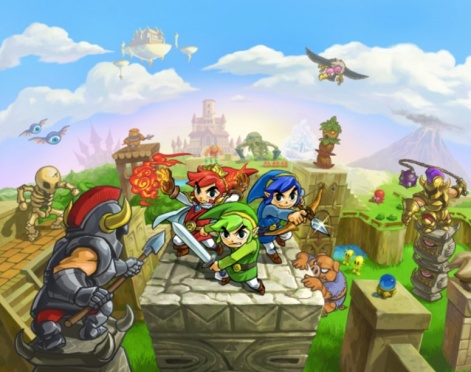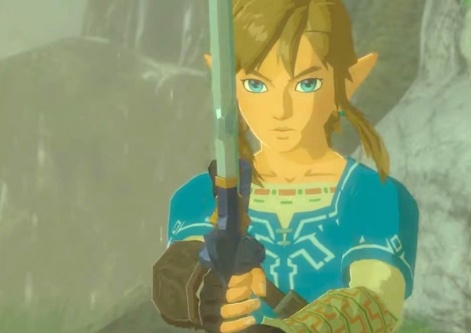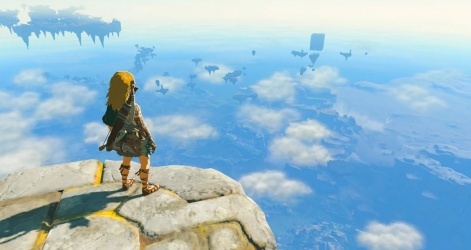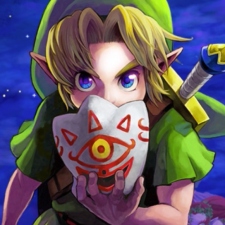The Legend of Zelda is one of the world’s most beloved video game franchises with 37 years of history dating back to Nintendo’s NES origins. And the series is still going strong today with a sustained presence on Nintendo hardware from Ocarina of Time to Majora’s Mask, The Wind Waker to Skyward Sword and Breath of the Wild to Tears of the Kingdom.
The Zelda series is all about adventure, courage, and trying something new with these sentiments embodied in this week’s announcement of a Zelda movie in the works – a live-action adventure that Zelda creator Shigeru Miyamoto has been secretly working on for “many years now“.
The very idea of a Zelda film, let alone a live-action one, has generated countless conversations, casting speculations, and curiosity around how, exactly, a Zelda movie would work. But if The Super Mario Bros. Movie’s success is any indication, Nintendo will find a way.
And with the Zelda movie being developed in an initiative to reach people “through different means” one has to ask: what about mobile? As the world’s most popular gaming platform, a mobile Zelda game would surely be the perfect way to get the IP into more hands, allowing ease of access for host of new fans with many likely to switch to Switch in the process.
The legendary Zelda
Developed and published by Nintendo, The Legend of Zelda first launched in Japan on February 21 1986 and debuted in the West a year later. The series quickly became a household name and reached new heights on the N64 with Ocarina of Time, the 1998 title that defined what a 3D game could be.
For almost 20 years thereafter, the IP struggled to reach Ocarina of Time’s lofty heights for a second time, but the Switch era brought new popularity to the series with Breath of the Wild proving a massive success, quadrupling the N64 title’s sales at over 31 million so far.
The 2017 title wasn’t a one-off, either. Its sequel Tears of the Kingdom launched in May 2023 and has since sold 19.5 million units worldwide, becoming one of the top 10 best-selling Switch games in less than half a year.
All in all, the Zelda IP has generated over 160 million unit sales in its lifetime; that’s a gigantic number already, but given mobile’s even bigger playerbase, perhaps a mobile Zelda game could reach an even higher peak.
Nintendo’s mobile links

Nintendo is no stranger to mobile games, but it’s no secret that the company hasn’t always used mobile to its fullest potential either. Last year, Nintendo explained that generating profits on mobile is important, but for the Japanese giant, mobile’s main utility is “to expand the number of people who have access to Nintendo [intellectual property]”.
This helps explain monetisation changes to games like Mario Kart Tour, which removed its gacha mechanics and completely overhauled its financial model. Mobile game Pokémon Masters, meanwhile, continues to use a gacha as its main source of monetisation.
Both these games were made in collaboration with fellow Japanese games maker DeNA, a mobile specialist and Nintendo’s digital services partner. Of course, DeNA also has a hand to play in Nintendo’s most lucrative mobile game, Fire Emblem Heroes.
Nintendo’s other key mobile partner is Niantic, with Pokémon Go naturally being their most famous collaboration. Nintendo only owns a third of The Pokémon Company though, so ultimately has closer ties to Niantic through Pikmin Bloom.
The mobile Pikmin game was used to help promote Pikmin 4 on the Switch this summer, just as Go regularly promotes Pokémon and Heroes promotes Fire Emblem. The Switch games championed this way have become some of the most successful in their respective series, so clearly Nintendo is onto a winning strategy in leveraging mobile campaigns. So once again, why not give Zelda that same boost with a mobile game of its own?
A breath of fresh air

When announcing the new Zelda film, Nintendo explained its reasoning as follows: “By producing visual contents of Nintendo IP by itself, Nintendo is creating new opportunities to have people from around the world to access the world of entertainment which Nintendo has built, through different means apart from its dedicated game consoles.”
Getting speculative now, those “different means” could well include a mobile avenue. And there are plenty of approaches Nintendo could take with such a Zelda game, some far more likely than others; yes, an outsourced match3 puzzle game with a Zelda coat of paint is technically possible, but it’s not very likely given Nintendo’s reputation for revolution.
By the same token, a mobile port of the original NES game isn’t very likely either. While retro re-releases aren’t unprecedented in the industry – Square Enix’s SNES title Chrono Trigger rereleased on iOS and Android, for example – it’s not something we’ve seen from Nintendo before.
Instead, Nintendo typically releases original mobile games that take a twist on the gameplay of their source materials; looking again at Pokémon Masters for an example, its gameplay is built around triple battles where three Pokémon on each team fight simultaneously, as opposed to the series’ traditional one-on-one brawls.
Given their history with Nintendo, the two contenders best suited to spin a hypothetical mobile Zelda game into something fresh are, of course, DeNA and Niantic. In the case of a DeNA game, I envisage a title built around dungeon exploration, fighting classic monsters and forging better materials to do it all again. Fans of the RPG genre are the most loyal of all mobile gamers, and core mechanics like skill tree investments and weapons upgrades would surely help them commit for the long haul.
As for its monetisation, this hypothetical game would be sustained by a gacha. Link has limitless alt potential through his main series costumes – from his classic green tunic to the bright blues of Breath of the Wild, and even the Fierce Deity – with room for plenty of other Zelda characters besides. Fans are always eager for Zelda herself to be playable, and a gacha system could provide the rare opportunity to do so.
Naturally, other popular characters like Ganondorf, Skull Kid, Sidon and Tingle could be introduced too, encouraging existing fans to spend in-game for their favourites and intriguing new fans to try out these characters’ original games; it’s a win-win.

Next up is Niantic. In this scenario, I see an experience focused on walking around the real world, as is Niantic’s speciality. Players would search their environments for in-game animals, flowers and treasures, taking AR photos of each towards and filling up their Hyrule Compendium – the player’s encyclopedia in Breath of the Wild and Tears of the Kingdom.
If Nintendo was feeling especially ambitious, the games could even be cross-compatible, with filling an encyclopedia entry on mobile adding that same AR photo to the Switch games’ libraries.
There would be monsters to fight too: Moblins, Bokoblins, Keese, Lynels… I imagine these monsters would predominantly mirror their designs on Switch to create familiarity, encouraging player transfer across both platforms.
In the mobile game, these monsters’ material drops could go towards strengthening Link’s gear and certain items could even be used to make elixirs, inspired by Breath of the Wild’s recipes and functioning like Pokémon Go’s incense to make more monster spawns in the area.
Exploring uncharted territory
Given Nintendo came up with the original concept for Pokémon Go and the company’s value grew by $8 billion over the game’s opening weekend, it doesn’t seem like unreasonable conjecture to imagine the Japanese giant wanting a repeat of that success that it wouldn’t have to divide with The Pokémon Company.
As for Niantic, the AR wizard long struggled to find a second hit after Pokémon Go. It appears to have found one at last with Monster Hunter Now this autumn, another monster-based title leveraging a popular Japanese IP that generated over $30 million in its opening month. So why wouldn’t Niantic want to round out its top three with another big franchise from Japan?
For now, the reality is there are no Zelda games on mobile, and Nintendo hasn’t announced anything to the contrary. Yet, a willingness to expand its franchises to new outlets is encouraging, and with the upcoming Zelda film being a step in the wider market direction, we can only hope that Link and company will broaden their horizons soon.

